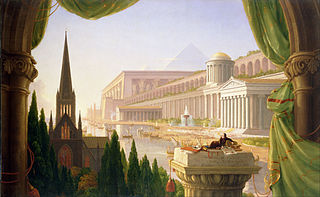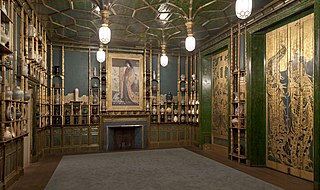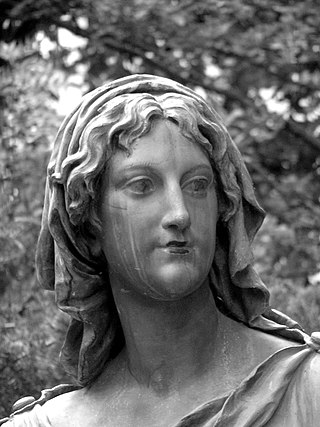Horror Victorianorum (terror of the Victorian), coined by the philosopher David Stove, is an extreme distaste or condemnation of Victorian culture, art and design. The term was used in Stove's book The Plato Cult as part of his argument against Karl Popper and other philosophers whom he characterised as "modernists". For Stove, Popper was influenced by the pervasive anti-Victorian mentality of the era, epitomised by Evelyn Waugh's book A Handful of Dust , in which the absurdity of Victorian values is expressed by a parody of "Victorian" conceptions of the civilizing mission of imperialism, when the hero is finally trapped in the Amazonian jungle, forced eternally to read the works of Dickens to a tribal chief.
For Stove, the ascription of absurdity to Victorian culture was essentially a matter of taste, but one so powerful and irrational that it possessed the intensity of religious faith. As a result, it produced a revulsion – rather than a reasoned scepticism – to writers such as the Victorian philosopher of science William Whewell.[ citation needed ]
Following Stove's usage, the term was taken up by the design historian Shelagh Wilson to refer to modernist distaste for Victorian architecture and design. Wilson argued that "Palissyite" design, influenced by the methods of Bernard Palissy, had been ridiculed and misunderstood by proponents of "Puginite" design, following the proto-modernist principles of Augustus Pugin. Wilson's argument formed part of a reaffirmation of the aesthetic principles of the grotesque.[ citation needed ]
The argument that distaste for Victorian cultural values ('Anti-victorianism') is irrational has been adopted by other writers, either following Stove's politically conservative attack on liberal thought, or Wilson's critique of modernism.[ citation needed ]

Erewhon: or, Over the Range is a novel by English writer Samuel Butler, first published anonymously in 1872, set in a fictional country discovered and explored by the protagonist. The book is a satire on Victorian society.

Historicism is an approach to explaining the existence of phenomena, especially social and cultural practices, by studying the process or history by which they came about. The term is widely used in philosophy, anthropology, and sociology.

Sir Karl Raimund Popper was an Austrian–British philosopher, academic and social commentator. One of the 20th century's most influential philosophers of science, Popper is known for his rejection of the classical inductivist views on the scientific method in favour of empirical falsification. According to Popper, a theory in the empirical sciences can never be proven, but it can be falsified, meaning that it can be scrutinised with decisive experiments. Popper was opposed to the classical justificationist account of knowledge, which he replaced with critical rationalism, namely "the first non-justificational philosophy of criticism in the history of philosophy".
Natural theology, once also termed physico-theology, is a type of theology that seeks to provide arguments for theological topics based on reason and the discoveries of science, the project of arguing for the existence of God on the basis of observed natural facts, and through natural phenomena viewed as divine, or complexities of nature seen as evidence of a divine plan or Will of God, which includes nature itself.
Relativism is a family of philosophical views which deny claims to objectivity within a particular domain and assert that valuations in that domain are relative to the perspective of an observer or the context in which they are assessed. There are many different forms of relativism, with a great deal of variation in scope and differing degrees of controversy among them. Moral relativism encompasses the differences in moral judgments among people and cultures. Epistemic relativism holds that there are no absolute principles regarding normative belief, justification, or rationality, and that there are only relative ones. Alethic relativism is the doctrine that there are no absolute truths, i.e., that truth is always relative to some particular frame of reference, such as a language or a culture. Some forms of relativism also bear a resemblance to philosophical skepticism. Descriptive relativism seeks to describe the differences among cultures and people without evaluation, while normative relativism evaluates the word truthfulness of views within a given framework.
Dialectic, also known as the dialectical method, refers originally to dialogue between people holding different points of view about a subject but wishing to arrive at the truth through reasoned argumentation. Dialectic resembles debate, but the concept excludes subjective elements such as emotional appeal and rhetoric. It has its origins in ancient philosophy and continued to be developed in the Middle Ages.

Aestheticism was an art movement in the late 19th century that valued the appearance of literature, music, fonts and the arts over their functions. According to Aestheticism, art should be produced to be beautiful, rather than to teach a lesson, create a parallel, or perform another didactic purpose, a sentiment best illustrated by the slogan "art for art's sake." Aestheticism flourished in the 1870s and 1880s, gaining prominence and the support of notable writers such as Walter Pater and Oscar Wilde.
Christian philosophy includes all philosophy carried out by Christians, or in relation to the religion of Christianity. Christian philosophy emerged with the aim of reconciling science and faith, starting from natural rational explanations with the help of Christian revelation. Several thinkers such as Origen of Alexandria and Augustine believed that there was a harmonious relationship between science and faith, others such as Tertullian claimed that there was contradiction and others tried to differentiate them.

The Open Society and Its Enemies is a work on political philosophy by the philosopher Karl Popper, in which the author presents a "defence of the open society against its enemies", and offers a critique of theories of teleological historicism, according to which history unfolds inexorably according to universal laws. Popper indicts Plato, Hegel, and Marx for relying on historicism to underpin their political philosophies.

In philosophy, the terms obscurantism and obscurationism identify and describe the anti-intellectual practices of deliberately presenting information in an abstruse and imprecise manner that limits further inquiry and understanding of a subject. The two historical and intellectual denotations of obscurantism are: (1) the deliberate restriction of knowledge — opposition to the dissemination of knowledge; and (2) deliberate obscurity — a recondite style of writing characterized by deliberate vagueness.
David Charles Stove was an Australian philosopher whose writings often challenged prevailing academic orthodoxy. He was known for his critiques of postmodernism, feminism, and multiculturalism.
Philosophical realism – usually not treated as a position of its own but as a stance towards other subject matters – is the view that a certain kind of thing has mind-independent existence, i.e. that it exists even in the absence of any mind perceiving it or that its existence is not just a mere appearance in the eye of the beholder. This includes a number of positions within epistemology and metaphysics which express that a given thing instead exists independently of knowledge, thought, or understanding. This can apply to items such as the physical world, the past and future, other minds, and the self, though may also apply less directly to things such as universals, mathematical truths, moral truths, and thought itself. However, realism may also include various positions which instead reject metaphysical treatments of reality entirely.

The Republic is a Socratic dialogue, authored by Plato around 375 BC, concerning justice, the order and character of the just city-state, and the just man. It is Plato's best-known work, and one of the world's most influential works of philosophy and political theory, both intellectually and historically.
Absurdity is the state or condition of being unreasonable, meaningless, or so unsound as to be irrational. "Absurd" is the adjective used to describe absurdity, e.g., "Tyler and the boys laughed at the absurd situation." It derives from the Latin absurdum meaning "out of tune". The Latin surdus means "deaf", implying stupidity. Absurdity is contrasted with being realistic or reasonable In general usage, absurdity may be synonymous with nonsense, meaninglessness, fancifulness, foolishness, bizarreness, wildness. In specialized usage, absurdity is related to extremes in bad reasoning or pointlessness in reasoning; ridiculousness is related to extremes of incongruous juxtaposition, laughter, and ridicule; and nonsense is related to a lack of meaningfulness. Absurdism is a concept in philosophy related to the notion of absurdity.

Modernist literature originated in the late 19th and early 20th centuries, and is characterised by a self-conscious separation from traditional ways of writing in both poetry and prose fiction writing. Modernism experimented with literary form and expression, as exemplified by Ezra Pound's maxim to "Make it new." This literary movement was driven by a conscious desire to overturn traditional modes of representation and express the new sensibilities of the time. The immense human costs of the First World War saw the prevailing assumptions about society reassessed, and much modernist writing engages with the technological advances and societal changes of modernity moving into the 20th century. In Modernist Literature, Mary Ann Gillies notes that these literary themes share the "centrality of a conscious break with the past", one that "emerges as a complex response across continents and disciplines to a changing world".

Alan Edward Musgrave is an English-born New Zealand philosopher.
Articles in social and political philosophy include:

Popper and After: Four Modern Irrationalists is a book about irrationalism by the philosopher David Stove. First published by Pergamon Press in 1982, it has since been reprinted as Anything Goes: Origins of the Cult of Scientific Irrationalism and Scientific Irrationalism: Origins of a Postmodern Cult.

The paradox of tolerance states that if a society's practice of tolerance is inclusive of the intolerant, intolerance will ultimately dominate, eliminating the tolerant and the practice of tolerance with them. Karl Popper describes the paradox as arising from the fact that, in order to maintain a tolerant society, the society must retain the right to be intolerant of intolerance.

Antitheatricality is any form of opposition or hostility to theater. Such opposition is as old as theater itself, suggesting a deep-seated ambivalence in human nature about the dramatic arts. Jonas Barish's 1981 book, The Antitheatrical Prejudice, was, according to one of his Berkeley colleagues, immediately recognized as having given intellectual and historical definition to a phenomenon which up to that point had been only dimly observed and understood. The book earned the American Theater Association's Barnard Hewitt Award for outstanding research in theater history. Barish and some more recent commentators treat the anti-theatrical, not as an enemy to be overcome, but rather as an inevitable and valuable part of the theatrical dynamic.